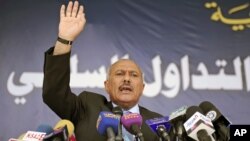Recent revelations by a United Nations panel that former Yemen President Ali Abdullah Saleh allegedly took as much as $60 billion through corruption during his many years in power has left analysts wondering how that is possible.
Torn by political and social unrest, Yemen is so poor that the purported corruption total dwarfs the country’s 2013 Gross National Income of $36 billion.
“The charge that he may have gobbled up as much as $60 billion from the sparse taking of the Yemeni economy is implausible,” said former U.S. Ambassador David Mack, an analyst with the Middle East Institute in Washington. “Gross exaggeration is a recurring theme in the attacks on deposed Arab autocrats as if their documented misbehavior is not bad enough.”
Disputes $60B figure
Another Yemen expert, Peter Salisbury, who in 2013 published a report on Yemen’s corruption through the London-based research organization Chatham House, also disputes that figure.
“I think that $32 billion, let alone $60 billion, is a far higher number than Saleh actually has in the bank,” Salisbury said.
“The estimate they [the U.N. panel] produced is probably closer to the total amount held by the entire network Saleh built over the course of his 30-odd years as president, a big chunk of which quit the regime in 2011," he added. "Yemen has never been a country that raises the kind of revenues where one person could skim that amount off.”
While not offering in-depth details, the U.N. report said Saleh moved money abroad under “false identity” accounts, or through the hands of people working on behalf of him. The figures include property, shares, gold and other valuables, as well as cash, that could have been dispersed among as many as 20 countries, the report said.
“Given that Saleh had more than 30 years to accumulate his wealth, it does seem plausible,” said analyst Andrew Liepman, who assesses Yemen for the RAND corporation. “If he skimmed 5 percent of the Gross Domestic Product [of Yemen] each year and invested wisely, that’s a ton of money.”
Saleh was elected by parliament to the Presidency of the Yemen Arab Republic in 1978 and ruled with an iron hand until 2011. He agreed to step down in a plan by the Gulf Cooperation Council (GCC) that would grant him immunity from prosecution and left office in 2012. He remains a divisive political figure as Yemen grasps with political turmoil.
A Shi’ite militia group, the al-Houthis, seized the capital Sana'a and much of the north in September and have since battled with Sunni tribesmen backed by al-Qaida militants in Yemen's central mountains.
“When the GCC deal was signed, the main issue for its backers -- the Gulf states, the West, the U.N. -- was to restore some stability to Yemen,” said analyst Salisbury. “They were genuinely worried that the country was on the verge of collapsing into a Somalia-like chaos, and that this would prove a fertile breeding ground for al-Qaida.”
Said RAND’s Liepman: “It’s easier in hindsight to criticize the deal than it would have been contemporaneously. It was vitally important to get Saleh out of office -- he was causing significant turmoil. ... At the time, giving Saleh immunity seemed a reasonable price to pay to convince him to move aside.”
Immunity deal
Analyst Graeme Bannerman at the Washington-based U.S. Institute for Peace said the GCC immunity deal was more than a political one.
“I think the GCC saw this as an opportunity to replace the Zaydi [a Yemeni tribe Saleh belongs to] ruler with a Sunni [Abd-Rabbu Mansour Hadi] in the greater ideological/political struggle with Iran,” he said. “They were not particularly hostile to Saleh.”
President Hadi resigned in January when the Houthis took control of Sa’naa and other parts of Yemen.
The U.N. report said that Saleh, backed by military elements in Yemen, “colluded with the Houthis in what resulted in a coup d’etat” that drove Hadi from power.
Analyst Salisbury said there has been lack of follow-through regarding Saleh and his return to Yemen.
“The bigger problem was that once he was out as president, they didn’t continue to exert the kind of pressure that was needed to get him and his family out of Yemen, and neither did Hadi,” he said.
So far, there has been little fallout in Yemen from the U.N. report, analysts said.
As to whether Saleh’s presence in Yemen today is destabilizing Yemen, analyst Bannerman said, “Saleh continues to have a significant following, particularly in the security forces and his tribal allies. He is only destabilizing if you are opposed to him. If you are a Zaydi ally, Saleh is a force for stability and legitimacy.”





